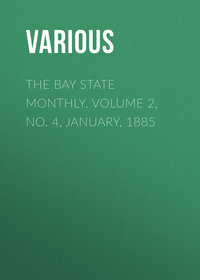Kitabı oku: «The Bay State Monthly. Volume 2, No. 4, January, 1885», sayfa 8
GOVERNOR CLEVELAND AND THE ROMAN CATHOLIC PROTECTORY
BY CHARLES COWLEY, LL.D
It is not often that a Governor’s objections to a measure, which his veto has defeated, become, even indirectly, the subject of judicial consideration. Such, however, has been the experience of Governor Cleveland in connection with his veto of the appropriation, which was made in 1883, to the Roman Catholic Protectory of the City of New York. And it must be gratifying to him as a constitutional lawyer, to see the principles of that veto entirely approved by all the judges of the Court of Appeals, as well as by all the judges by whom those principles were considered, before the case, in which they were involved, reached that august tribunal, the highest in the judicial system of that State.
By an amendment to the Constitution of New York, adopted in 1874, it is provided that, "Neither the credit nor the money of the State shall be given, or loaned to, or in aid of, any association, corporation, or private undertaking."
It would hardly seem possible to mistake the meaning of a prohibition like this; but this prohibition is accompanied by the following modification: "This section shall not, however, prevent the Legislature from making such provision for the education and support of the blind, the deaf and dumb, and juvenile delinquents, as to it may seem proper; nor shall it apply to any fund or property, now held by the State for educational purposes."
The question, how far this qualifying clause limits the proceeding prohibition, arose first in the Court of Common Pleas, and afterwards in the Court of Appeals, in the case of the Shepherd’s Fold of the Protestant Episcopal Church vs. The Mayor, Aldermen and Commonalty of the City of New York.38 The Attorney-General of the State had given an official opinion, tending to the conclusion that the prohibition is almost entirely neutralized by the modification. The Judges of the Court of Common Pleas, and the lawyers who argued this case in either court, differed widely upon the question, whether money raised by local taxation by the City of New York, under the authority of the State law, for the maintainance of the children of the Shepherd’s Fold, was, or was not, "money of the State," and therefore included in the terms of this prohibition; and when one sees how much is done in the discussions of the able counsel before the Court of final resort, and by the learned opinion of Judge Rapello, to reconcile these differences, one can not but wish that the Old Bay State had a similar Court of Appeals, to revise and clarify the decisions of her Supreme Court. About twenty-five per cent, of all the decisions of the General Terms of the Supreme Court, Superior Court, and Court of Common Pleas, which are carried to the Court of Appeals, are there reversed; and can any lawyer doubt that, at least, as large a proportion of the decisions of our Supreme Judicial Court ought also to be revised and reversed?
The Court of Appeals says: "It seems to us that that section [to wit, the prohibition above quoted] had reference to money raised by general taxation throughout the State, or revenues of the State, or money otherwise belonging to the State treasury, or payable out of it."
The money claimed by the Shepherd’s Fold being raised by local taxation for a local purpose in the city of New York, and not "by general taxation throughout the State," the Court of Appeals holds that it is not within the terms of the Constitutional prohibition, and therefore reverses the decision of the Court of Common Pleas on that particular point, while agreeing with it on the main question.
As the money, appropriated to the Roman Catholic Protectory, was unquestionably money of the State, "being raised by general taxation throughout the State," that appropriation was unquestionably in conflict with the prohibition of the Constitution, which the Governor was sworn to support.
Of the courage and independence displayed by Governor Cleveland in thus vetoing a measure in which so large a number of his political supporters might be supposed to feel so deep an interest, this is not the place to speak. But it is creditable to him as a lawyer that alone without a single precedent to guide him, relying upon his own judicial sense, and rejecting the opinion of a former Attorney-General, he challenged "the validity of this appropriation under that section of the Constitution." The Protectory, he says, "appears to be local in its purposes and operations." And being a sectarian charity, he adds, "Public funds should not be contributed to its support. A violation of this principle in this case would tend to subject the state treasury to demands in behalf of all sorts of sectarian institutions, which a due care for the money of the State, and a just economy, could not concede."
In the higher and broader field of public service—"the grandest throne on earth"—as the Presidency which he is about to enter, has been grandiloquently called, let us hope that he will display the same honesty, capability, and fidelity to the Constitution. We shall then be assured that the interests of the Republic will suffer no detriment at his hands.
